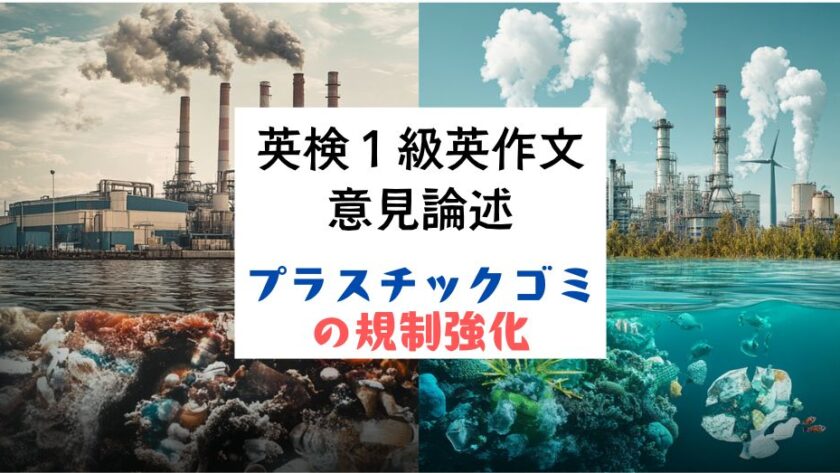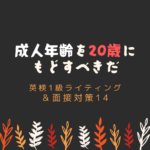(簡単★~難しい★★★★★)語彙難易度★★

目次
Question: Should governments enforce stricter regulations on plastic production?
(政府はプラスチック生産に対してもっと厳しい規制を施行すべきでしょうか?)
トレーニング手順
200~240語程度、3つの観点、目標解答時間:約25分
- 分野・トピック毎の観点とキーワードをまとめる
以下の画像のようなイメージ図にしておくと、記憶に定着するのでおススメ - 自分が書きやすい立場・観点で実際に書く
分からない表現はすぐに調べて15分程度で書く - 続いて、先ほどとは反対意見で書いてみる
分からない表現はすぐに調べて15分程度で書く - そのトピックについて実際に誰かと話す、又は1分スピーチをする
- 同じ分野で3つくらいの意見論述を作成する
例えば、宇宙なら宇宙植民・宇宙採掘・宇宙旅行など
6つの観点 (Perspectives)
単純化したイラストで整理することで、記憶に定着しやすくなります。
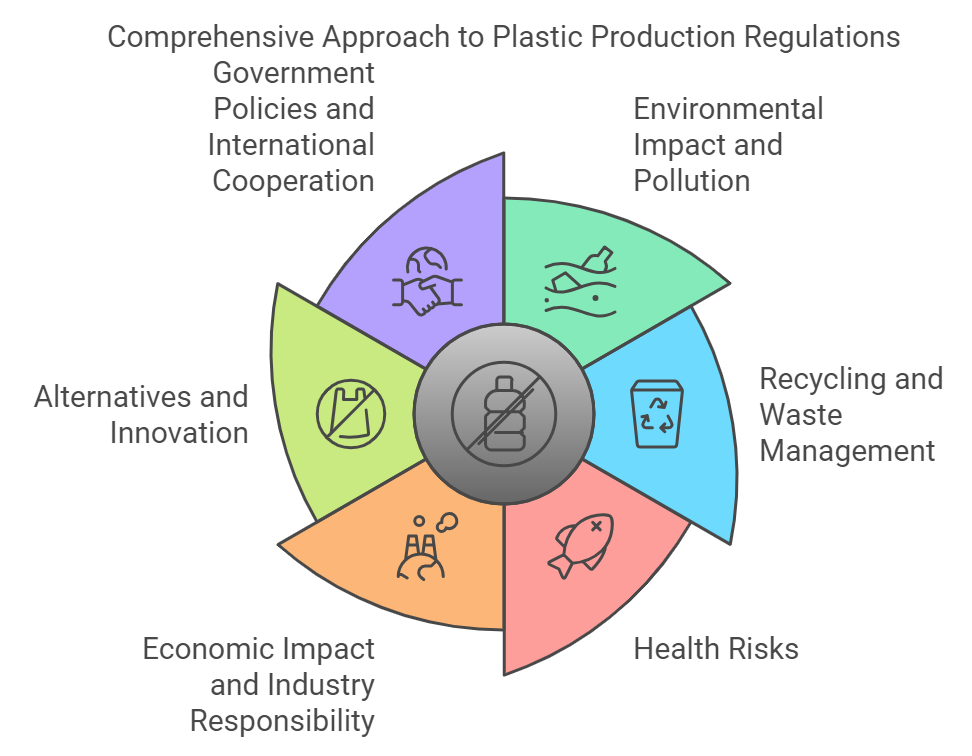
観点 (Perspectives)
- Environmental Impact and Pollution (環境への影響と汚染)
- Plastic waste is a significant contributor to environmental pollution, affecting ecosystems, oceans, and wildlife.
- Recycling and Waste Management (リサイクルと廃棄物管理)
- Improving recycling systems and waste management strategies is crucial to reducing the amount of plastic waste.
- Health Risks (健康リスク)
- Microplastics from plastic waste can enter food chains, potentially posing health risks to humans and animals.
- Economic Impact and Industry Responsibility (経済的影響と産業の責任)
- The plastic industry plays a major role in global economies, but it also bears responsibility for reducing plastic waste through innovations and sustainable practices.
- Alternatives and Innovation (代替案と革新)
- Developing biodegradable alternatives to plastics and innovative materials can help reduce plastic pollution in the long term.
- Government Policies and International Cooperation (政府の政策と国際協力)
- Governments and international bodies must work together to create effective policies for plastic waste reduction and enforce regulations on plastic production and disposal.
キーワード (Keywords)
- plastic pollution (プラスチック汚染)
- microplastics (マイクロプラスチック)
- waste management (廃棄物管理)
- recycling systems (リサイクルシステム)
- biodegradable plastics (生分解性プラスチック)
- ocean pollution (海洋汚染)
- environmental sustainability (環境持続可能性)
- health risks (健康リスク)
- government regulations (政府の規制)
- circular economy (循環型経済)
使われそうな動詞 (Verbs)
- recycle (リサイクルする)
- reduce (減らす)
- contaminate (汚染する)
- innovate (革新する)
- decompose (分解する)
- manage (管理する)
- regulate (規制する)
- mitigate (軽減する)
- enforce (施行する)
- substitute (代替する)
使われそうな形容詞 (Adjectives)
- recyclable (リサイクル可能な)
- biodegradable (生分解性の)
- non-biodegradable (非生分解性の)
- sustainable (持続可能な)
- eco-friendly (環境に優しい)
- hazardous (有害な)
- pervasive (蔓延した)
- innovative (革新的な)
- resource-efficient (資源効率の良い)
- toxic (有毒な)
使われそうな副詞 (Adverbs)
- sustainably (持続可能に)
- responsibly (責任を持って)
- efficiently (効率的に)
- globally (世界的に)
- progressively (段階的に)
- environmentally (環境的に)
- widely (広く)
- effectively (効果的に)
- economically (経済的に)
- safely (安全に)
Yes: プラスチック生産への厳しい規制は必要だ
Governments should enforce stricter regulations on plastic production to address the environmental impact, improve recycling systems, and mitigate health risks. These measures are essential to protect the planet and ensure the well-being of future generations.
First, the environmental impact of plastic pollution is devastating. Plastics take hundreds of years to decompose, and vast amounts end up in oceans, harming marine life and ecosystems. Stricter regulations on plastic production would reduce the overall volume of plastic waste, helping to preserve the environment and protect wildlife from the dangers of plastic pollution.
Second, stricter regulations could improve recycling and waste management. Current systems are often insufficient, with only a small percentage of plastic actually being recycled. By enforcing laws that require more efficient recycling and the reduction of single-use plastics, governments can significantly decrease the amount of plastic waste. This would also encourage industries to invest in more sustainable packaging solutions and waste management technologies.
Finally, plastic production poses serious health risks due to microplastics. These tiny particles break down from plastic waste and enter the food chain, potentially harming human health. Regulating plastic production would reduce the amount of plastic that enters the environment, thereby decreasing the risk of microplastic contamination.
In conclusion, stricter government regulations on plastic production are necessary to reduce environmental pollution, enhance recycling, and safeguard public health. These measures are vital for creating a more sustainable and healthy future. (232 words)
賛成意見の訳と用語
Governments should enforce stricter regulations on plastic production to address the environmental impact, improve recycling systems, and mitigate health risks. These measures are essential to protect the planet and ensure the well-being of future generations.
イントロ: プラスチック生産への規制強化が必要な理由
政府は、環境への影響に対処し、リサイクルシステムを改善し、健康リスクを軽減するために、プラスチック生産に対して厳しい規制を施行すべきである。これらの措置は、地球を守り、将来の世代の幸福を確保するために必要不可欠である。
- “enforce stricter regulations”(厳しい規制を施行する)
類語: “implement tougher rules,” “impose tighter regulations”
反語: “relax regulations,” “loosen rules” - “address the environmental impact”(環境への影響に対処する)
類語: “tackle environmental issues,” “deal with environmental damage”
反語: “ignore environmental impact,” “neglect environmental issues” - “mitigate health risks”(健康リスクを軽減する)
類語: “reduce health dangers,” “lessen health hazards”
反語: “increase health risks,” “worsen health hazards”
First, the environmental impact of plastic pollution is devastating. Plastics take hundreds of years to decompose, and vast amounts end up in oceans, harming marine life and ecosystems. Stricter regulations on plastic production would reduce the overall volume of plastic waste, helping to preserve the environment and protect wildlife from the dangers of plastic pollution.
ボディ1: 環境への影響
まず、プラスチック汚染の環境への影響は壊滅的である。プラスチックは分解に数百年を要し、その多くが海に流れ込み、海洋生物や生態系に害を与えている。プラスチック生産に対する厳しい規制は、全体的なプラスチック廃棄物の量を減少させ、環境を保護し、野生動物をプラスチック汚染の危険から守る助けとなる。
- “environmental impact”(環境への影響)
類語: “environmental footprint,” “ecological consequences”
反語: “environmental benefit,” “positive environmental effect” - “decompose”(分解する)
類語: “break down,” “disintegrate”
反語: “remain intact,” “stay whole” - “harm marine life and ecosystems”(海洋生物や生態系に害を与える)
類語: “damage marine life and habitats,” “endanger sea creatures and ecosystems”
反語: “protect marine life,” “preserve ecosystems”
Second, stricter regulations could improve recycling and waste management. Current systems are often insufficient, with only a small percentage of plastic actually being recycled. By enforcing laws that require more efficient recycling and the reduction of single-use plastics, governments can significantly decrease the amount of plastic waste. This would also encourage industries to invest in more sustainable packaging solutions and waste management technologies.
ボディ2: リサイクルシステムの改善
次に、厳しい規制はリサイクルや廃棄物管理の改善に役立つ。現在のシステムはしばしば不十分であり、実際にリサイクルされるプラスチックの割合はごくわずかである。より効率的なリサイクルや使い捨てプラスチックの削減を義務付ける法律を施行することで、政府はプラスチック廃棄物の量を大幅に減少させることができるだろう。これにより、企業はより持続可能な包装ソリューションや廃棄物管理技術に投資するよう促される。
- “improve recycling and waste management”(リサイクルと廃棄物管理を改善する)
類語: “enhance recycling and disposal systems,” “strengthen waste management”
反語: “worsen waste management,” “neglect recycling” - “insufficient”(不十分な)
類語: “inadequate,” “lacking”
反語: “sufficient,” “adequate” - “efficient recycling”(効率的なリサイクル)
類語: “effective recycling,” “streamlined recycling”
反語: “inefficient recycling,” “wasteful recycling”
Finally, plastic production poses serious health risks due to microplastics. These tiny particles break down from plastic waste and enter the food chain, potentially harming human health. Regulating plastic production would reduce the amount of plastic that enters the environment, thereby decreasing the risk of microplastic contamination.
ボディ3: 健康リスクの軽減
最後に、プラスチックの生産は、マイクロプラスチックによる深刻な健康リスクをもたらす。これらの小さな粒子はプラスチック廃棄物から分解され、食物連鎖に入り込み、人間の健康に悪影響を与える可能性がある。プラスチック生産を規制することで、環境に流入するプラスチックの量を減らし、マイクロプラスチック汚染のリスクを軽減することができる。
- “poses serious health risks”(深刻な健康リスクをもたらす)
類語: “creates major health hazards,” “presents significant health threats”
反語: “eliminates health risks,” “avoids health dangers” - “microplastics”(マイクロプラスチック)
語彙: 極小のプラスチック粒子を指し、プラスチックが分解されて非常に小さな粒子となり、環境や人体に悪影響を及ぼすもの。
類語: “plastic particles,” “nano-plastics” - “enter the food chain”(食物連鎖に入る)
類語: “penetrate the food chain,” “infiltrate the food web”
反語: “exit the food chain,” “be excluded from the food chain”
In conclusion, stricter government regulations on plastic production are necessary to reduce environmental pollution, enhance recycling, and safeguard public health. These measures are vital for creating a more sustainable and healthy future.
結論: より持続可能で健康的な未来のために
結論として、環境汚染を減らし、リサイクルを強化し、公衆の健康を守るためには、プラスチック生産に対する厳しい政府の規制が必要である。これらの措置は、より持続可能で健康的な未来を創造するために欠かせない。
- “safeguard public health”(公衆の健康を守る)
類語: “protect public health,” “ensure the well-being of society”
反語: “endanger public health,” “threaten the well-being of people” - “vital for”(~にとって不可欠な)
類語: “essential for,” “crucial to”
反語: “unnecessary for,” “irrelevant to” - “sustainable future”(持続可能な未来)
類語: “eco-friendly future,” “long-lasting future”
反語: “unsustainable future,” “short-sighted future” - “stricter government regulations”(より厳しい政府規制)
類語: “tighter government controls,” “more rigorous policies”
反語: “looser government regulations,” “weaker rules”
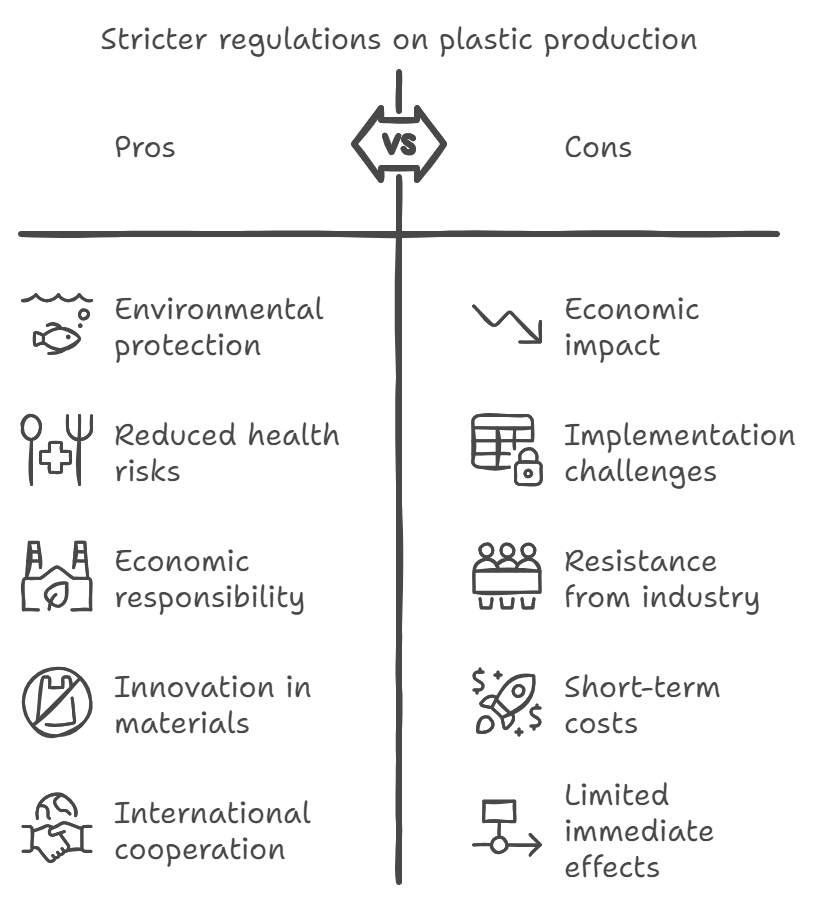
No: プラスチック生産への厳しい規制は必要ない
Governments should not enforce stricter regulations on plastic production, as such measures could harm the economy, overlook the importance of innovation, and fail to address global cooperation. Instead, a more balanced approach is necessary.
First, imposing stricter regulations on plastic production could negatively impact the economy. The plastic industry plays a significant role in global manufacturing, packaging, and other sectors. Overly harsh restrictions may lead to job losses and increased costs for businesses, which could hurt consumers by raising prices for everyday products. A sudden shift away from plastic would disrupt many industries that rely on it for affordable and efficient production.
Second, innovation and the development of alternatives offer better solutions than strict regulations. Rather than limiting plastic production, governments should encourage research into biodegradable materials and sustainable alternatives. By focusing on innovation, the plastic industry can evolve to reduce its environmental impact without drastically affecting the economy or consumer choice.
Finally, plastic pollution is a global issue that requires international cooperation, not just national regulations. Even if some countries enforce stricter rules, the global nature of plastic production and trade means that unilateral actions will have limited impact. Collaborative international agreements would be more effective in reducing plastic waste worldwide.
In conclusion, instead of enforcing stricter regulations, governments should support innovation and work on global solutions to reduce plastic waste while protecting economic stability and consumer needs. (229 words)
反対意見の訳と用語
Governments should not enforce stricter regulations on plastic production, as such measures could harm the economy, overlook the importance of innovation, and fail to address global cooperation. Instead, a more balanced approach is necessary.
イントロ:プラスチック生産への規制強化は不要である理由
政府はプラスチック生産に対する厳しい規制を施行すべきではない。なぜなら、このような措置は経済に悪影響を与え、イノベーションの重要性を見落とし、国際的な協力を欠くからである。むしろ、よりバランスの取れたアプローチが必要である。
- “enforce stricter regulations”(厳しい規制を施行する)
類語: “impose tighter rules,” “implement tougher regulations”
反語: “relax regulations,” “loosen restrictions” - “harm the economy”(経済に悪影響を与える)
類語: “damage the economy,” “hurt economic growth”
反語: “benefit the economy,” “stimulate economic growth” - “overlook the importance of innovation”(イノベーションの重要性を見落とす)
類語: “ignore the significance of innovation,” “fail to recognize the value of innovation”
反語: “recognize the importance of innovation,” “acknowledge the significance of innovation”
First, imposing stricter regulations on plastic production could negatively impact the economy. The plastic industry plays a significant role in global manufacturing, packaging, and other sectors. Overly harsh restrictions may lead to job losses and increased costs for businesses, which could hurt consumers by raising prices for everyday products. A sudden shift away from plastic would disrupt many industries that rely on it for affordable and efficient production.
ボディ1:第一段落: 経済への悪影響
まず、プラスチック生産に対する厳しい規制は、経済に悪影響を与える可能性がある。プラスチック産業は、世界の製造業、包装業、その他の分野で重要な役割を果たしている。過度に厳しい規制は、雇用の喪失や企業にとってのコスト増加につながり、日常的な製品の価格を上昇させることで消費者に打撃を与えるだろう。プラスチックからの急激な移行は、手頃で効率的な生産に依存している多くの産業を混乱させる可能性がある。
- “negatively impact the economy”(経済に悪影響を与える)
類語: “harm the economy,” “damage economic growth”
反語: “positively impact the economy,” “boost economic growth” - “job losses”(雇用の喪失)
類語: “unemployment,” “redundancies”
反語: “job creation,” “employment growth” - “disrupt industries”(産業を混乱させる)
類語: “upset industries,” “cause disruption in industries”
反語: “support industries,” “stabilize industries”
Second, innovation and the development of alternatives offer better solutions than strict regulations. Rather than limiting plastic production, governments should encourage research into biodegradable materials and sustainable alternatives. By focusing on innovation, the plastic industry can evolve to reduce its environmental impact without drastically affecting the economy or consumer choice.
ボディ2:イノベーションの重要性
次に、イノベーションと代替材料の開発は、厳しい規制よりも優れた解決策を提供する。プラスチック生産を制限するのではなく、政府は生分解性材料や持続可能な代替材料の研究を奨励すべきである。イノベーションに焦点を当てることで、プラスチック産業は経済や消費者の選択肢に大きな影響を与えることなく、環境への影響を減少させる方向に進化することができる。
- “innovation”(イノベーション)
類語: “technological advancement,” “creative development”
反語: “stagnation,” “lack of progress” - “biodegradable materials”(生分解性材料)
類語: “eco-friendly materials,” “compostable materials”
反語: “non-degradable materials,” “synthetic materials” - “drastically affecting”(劇的に影響を与える)
類語: “significantly impacting,” “substantially influencing”
反語: “minimally affecting,” “hardly impacting”
Finally, plastic pollution is a global issue that requires international cooperation, not just national regulations. Even if some countries enforce stricter rules, the global nature of plastic production and trade means that unilateral actions will have limited impact. Collaborative international agreements would be more effective in reducing plastic waste worldwide.
ボディ3:国際協力の必要性
最後に、プラスチック汚染は国際的な問題であり、国家レベルの規制だけではなく国際協力が必要である。たとえ一部の国が厳しい規制を施行しても、プラスチック生産と貿易のグローバルな性質を考慮すると、一国単独の行動では効果は限定的である。国際的な協力による合意は、世界的なプラスチック廃棄物削減により効果的であろう。
- “plastic pollution”(プラスチック汚染)
類語: “plastic waste problem,” “plastic contamination” - “unilateral actions”(一国単独の行動)
類語: “independent actions,” “single-handed measures”
反語: “collaborative actions,” “multilateral actions” - “limited impact”(限定的な影響)
類語: “minimal impact,” “small influence”
反語: “wide-reaching impact,” “significant influence” - “collaborative international agreements”(国際的な協力による合意)
類語: “global treaties,” “multinational agreements”
反語: “unilateral agreements,” “individual treaties”
In conclusion, instead of enforcing stricter regulations, governments should support innovation and work on global solutions to reduce plastic waste while protecting economic stability and consumer needs.
結論:イノベーションと国際協力を重視した解決策
結論として、厳しい規制を施行するのではなく、政府はイノベーションを支援し、経済の安定と消費者のニーズを守りつつ、プラスチック廃棄物を削減するためのグローバルな解決策に取り組むべきである。
- “support innovation”(イノベーションを支援する)
類語: “encourage innovation,” “promote technological advancements”
反語: “stifle innovation,” “hinder technological progress” - “protecting economic stability”(経済の安定を守る)
類語: “safeguard economic stability,” “preserve economic stability”
反語: “destabilize the economy,” “threaten economic stability”
まとめ
学習振り返りコラム: プラスチック生産規制に関する賛成・反対論の比較
今回の学習では、プラスチック生産に対する政府の規制強化に関する賛成意見と反対意見を比較しながら、英検1級レベルのエッセイで重要な論理的な説得力のある文章展開と、汎用的に使える語彙やフレーズを学びました。これらのポイントを振り返り、英検1級のライティング対策にどう活かせるかを考えていきましょう。
論理的なエッセイを書くコツ
賛成と反対のエッセイでは、どちらも説得力のある論理的な構成が求められます。まず、賛成意見では、環境への影響、リサイクルの改善、健康リスクの軽減という3つの明確なポイントが提示され、それぞれがしっかりと論拠で支えられています。反対意見では、経済への影響、イノベーションの必要性、国際協力の重要性が取り上げられ、これも同様に説得力のある形で展開されています。
ここで注目すべきなのは、各段落で一つのテーマに焦点を当てるという点です。英検1級のエッセイでは、主張を分かりやすく整理し、それぞれの段落で具体的なサポートを提供することが重要です。段落ごとにトピックセンテンスを明確にし、その後に事実や論拠を述べることで、読み手に理解しやすく伝えることができます。
汎用的に使える語彙やフレーズ
今回のエッセイを通じて、環境問題や経済、技術革新に関連するトピックで使える語彙やフレーズを学びました。これらは他のトピックにも応用可能であり、エッセイの質を高めるために非常に役立ちます。
- “impose stricter regulations”(より厳しい規制を施行する)
- このフレーズは、規制や法的措置に関する議論で頻繁に使用できます。例えば、環境問題、経済政策、健康問題など、幅広いトピックに適用可能です。
- “negatively impact the economy”(経済に悪影響を与える)
- 経済への影響を論じる際、ポジティブ・ネガティブ両面で使えるフレーズです。異なる分野(教育、医療、環境など)の政策や対策が経済に与える影響を説明する時に有用です。
- “safeguard public health”(公衆の健康を守る)
- 健康問題や環境問題に関するエッセイで、健康を守るための措置を議論する際に役立ちます。ポジティブなアプローチを強調したい場合に特に有効です。
- “global cooperation”(国際協力)
- 環境、経済、テクノロジーなど、国際的な課題を論じる際に頻繁に使われるフレーズです。特に、環境問題やパンデミックのようなグローバルな視点が必要なトピックに最適です。
エッセイ全体の流れと結論のまとめ方
結論では、どちらの立場にせよ、主張を再確認し、論点をまとめ、読者に強い印象を残すことが重要です。例えば、賛成意見のエッセイでは、プラスチックの環境への影響を減らし、持続可能な未来を実現するために規制が不可欠だと結論づけています。一方、反対意見のエッセイでは、経済的安定性と消費者のニーズを守るために、イノベーションと国際協力がより効果的だと強調しています。
このように、自分の立場を明確にし、それを支持する論拠を整理して再提示することが、読者を説得するための鍵です。
まとめ
今回のエッセイでは、説得力のある論理的な構成の重要性と、汎用的に使える語彙やフレーズの活用法を学びました。英検1級のライティング試験では、幅広いトピックに対応するための語彙力と、意見を明確に伝えるための論理的な文章構成が求められます。引き続き、多様なテーマで練習し、より高いレベルの英作文力を身につけましょう。
英検1級英作文(意見論述・要約問題)・二次試験(面接)リストはコチラ
英検1級トピック探しにおススメのサイト:Britanica ProCon.org
英作文(意見論述・要約問題)対策テキスト
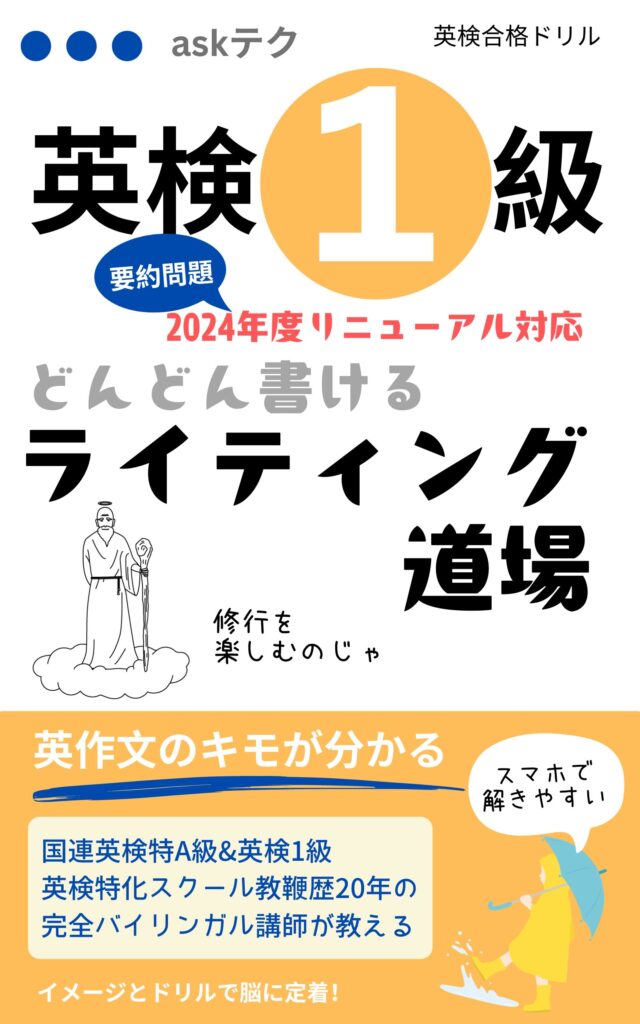
「どんなテキストがおすすめですか?」とよく聞かれるのですが、「問題量が多い」ものと「知識量を増やせるもの」の2種類を準備すると良いかと思います。
また、あまりにも文法解説が長いテキストは、英検1級対策としては、「?」という感じがします。
「何を、どんな観点で、どう伝えるか」にフォーカスして書かれたテキストを選んでください。
英作文テキストは、「最低でも3ラウンドする」。語彙や表現を増やす系のテキストは「最低でも5ラウンドする」つもりで、1ページごとに時間をかけすぎず、分からない時はすぐにググりながらテンポよく進めていきます。

